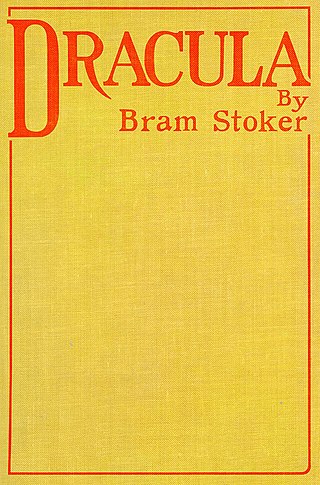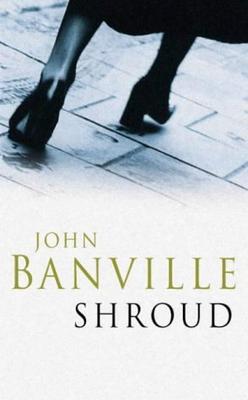The Booker Prize, formerly the Booker Prize for Fiction (1969–2001) and the Man Booker Prize (2002–2019), is a literary award conferred each year for the best novel written in the English language, which was published in the United Kingdom and Ireland. The winner of the Booker Prize receives international publicity which usually leads to a sales boost. When the prize was created, only novels written by Commonwealth, Irish, and South African citizens were eligible to receive the prize; in 2014 it was widened to any English-language novel—a change that proved controversial.

Dracula is a novel by Bram Stoker, published in 1897. An epistolary novel, the narrative is related through letters, diary entries, and newspaper articles. It has no single protagonist, but opens with solicitor Jonathan Harker taking a business trip to stay at the castle of a Transylvanian nobleman, Count Dracula. Harker escapes the castle after discovering that Dracula is a vampire, and the Count moves to England and plagues the seaside town of Whitby. A small group, led by Abraham Van Helsing, hunt Dracula and, in the end, kill him.
This article contains information about the literary events and publications of 1989.

John Maxwell Coetzee FRSL OMG is a South African and Australian novelist, essayist, linguist, translator and recipient of the 2003 Nobel Prize in Literature. He is one of the most critically acclaimed and decorated authors in the English language. He has won the Booker Prize (twice), the CNA Literary Award (thrice), the Jerusalem Prize, the Prix Femina étranger, and The Irish Times International Fiction Prize, and holds a number of other awards and honorary doctorates.

The first Irish prose fiction, in the form of legendary stories, appeared in the Irish language as early as the seventh century, along with chronicles and lives of saints in Irish and Latin. Such fiction was an adaptation and elaboration of earlier oral material and was the work of a learned class who had acquired literacy with the coming of Latin Christianity. A number of these stories were still available in manuscripts of the late medieval period and even as late as the nineteenth century, though poetry was by that time the main literary vehicle of the Irish language.

Roddy Doyle is an Irish novelist, dramatist and screenwriter. He is the author of eleven novels for adults, eight books for children, seven plays and screenplays, and dozens of short stories. Several of his books have been made into films, beginning with The Commitments in 1991. Doyle's work is set primarily in Ireland, especially working-class Dublin, and is notable for its heavy use of dialogue written in slang and Irish English dialect. Doyle was awarded the Booker Prize in 1993 for his novel Paddy Clarke Ha Ha Ha.
William Trevor Cox, known by his pen name William Trevor, was an Irish novelist, playwright, and short story writer. One of the elder statesmen of the Irish literary world, he is widely regarded as one of the greatest contemporary writers of short stories in the English language.

William John Banville is an Irish novelist, short story writer, adapter of dramas and screenwriter. Though he has been described as "the heir to Proust, via Nabokov", Banville himself maintains that W. B. Yeats and Henry James are the two real influences on his work.

Saturday (2005) is a novel by Ian McEwan. It is set in Fitzrovia, central London, on Saturday, 15 February 2003, as a large demonstration is taking place against the United States' 2003 invasion of Iraq. The protagonist, Henry Perowne, a 48-year-old neurosurgeon, has planned a series of errands and pleasures, culminating in a family dinner in the evening. As he goes about his day, he ponders the meaning of the protest and the problems that inspired it; however, the day is disrupted by an encounter with a violent, troubled man.

The Sea is a 2005 novel by John Banville. His thirteenth novel, it won the 2005 Booker Prize.
Thomas F. Kilroy is an Irish playwright and novelist.

The Book of Evidence is a 1989 novel by John Banville. Many of the characters in The Book of Evidence appear in the 1993 sequel Ghosts.
Alexander Evelyn Michael Waugh is an English writer, critic, and journalist. Among other books, he has written Fathers and Sons: The Autobiography of a Family (2004), about five generations of his own family, and The House of Wittgenstein: A Family at War (2008) about the Wittgenstein family. He is an advocate of the Oxfordian theory, which holds that Edward de Vere, 17th Earl of Oxford was the real author of the works of William Shakespeare.

Shroud is a 2002 novel by John Banville. It is the second book in the Alexander and Cass Cleave Trilogy, which also contains the novels Eclipse, published in 2000, and Ancient Light, published in 2012.
The Dublin Review is a quarterly magazine that publishes essays, reportage, autobiography, travel writing, criticism and fiction. It was launched in December 2000 by Brendan Barrington, who remains the editor and publisher, assisted by Nora Mahony and then Deanna Ortiz in 2013. An anthology of non-fiction pieces from the magazine, The Dublin Review Reader, appeared in 2007. The magazine has been noted for the range of its contributors, which includes new writers from Ireland and elsewhere. In his introduction to the Reader, Brendan Barrington wrote:
"If forced to articulate a governing idea behind the magazine, I might offer this: that the essay in its various guises is every bit as much an art form as the short story or poem, and ought to be treated as such."

Ancient Light is a 2012 novel by John Banville. First published on 7 July 2012, the novel concludes a trilogy concerning Alexander Cleave and his daughter, Cass. Eclipse (2000) and Shroud (2002) were Ancient Light's literary predecessors in the Banville canon.
Heather Elizabeth Ingman is a British academic, noted for her work on Irish and British women's writing, the Irish short story, gender studies and modernism. Also a novelist and journalist, Ingman has worked in Ireland and the UK, especially at Trinity College Dublin, where she is an Adjunct Professor of English and Research Fellow in Gender Studies.

John Banville: A Critical Study is a 1991 book by Joseph McMinn, which deals with the work of major turn of the century writer John Banville. It is part of Gill's Studies in Irish Literature series. McMinn claims to take a different approach to the "formalist" Rüdiger Imhof, who had until that time been the only other writer to treat of Banville's fiction.

John Banville: A Critical Introduction is a 1989 book by Rüdiger Imhof, which is the first full-length appraisal of the work of major turn of the century writer John Banville.
Mark O'Connell is an Irish author and journalist. His debut book, To Be A Machine was published in 2017, followed by Further Notes From an Apocalypse in 2020. He has written for publications including The New Yorker, The New York Times Magazine, The New York Review of Books, and The Guardian. He is also the author of the Kindle Single Epic Fail: Bad Art, Viral Fame, and the History of the Worst Thing Ever .., as well as an academic study of the novels of John Banville.












